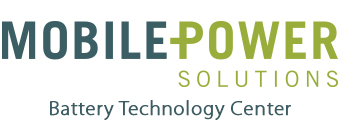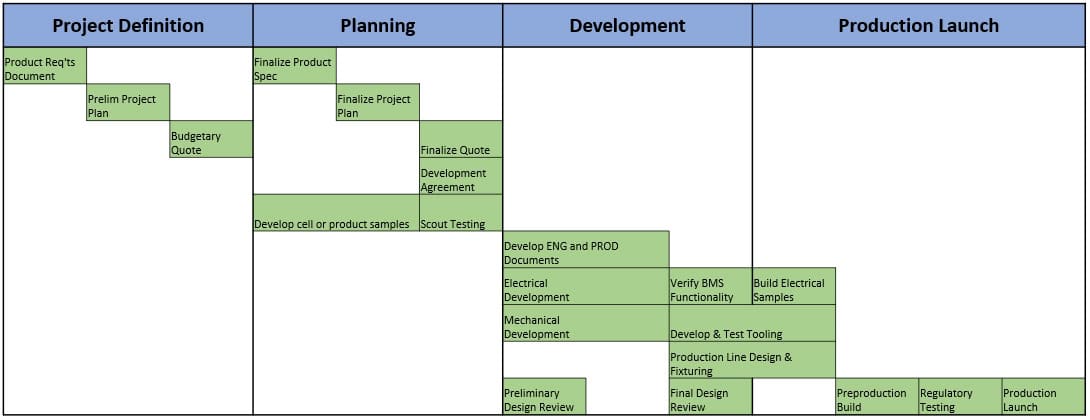DEVELOPMENT PROCESS
Mobile Power Solutions (MPS) uses a flexible, but structured, New Product Development (NPD) process to develop and produce custom batteries. This level of structure and detail in our NPD process can be defined on a per-customer basis, customized based on the project scope, and mirror and dovetail with the OEM’s development process for their mobile device.
Once a project has been launched, MPS will create a dedicated development team that may consist of the following skills (depending on the scope of the project);
- Project Manager,
- Account Manager,
- Cell Technologist,
- Electrical Engineer (or technologist),
- Mechanical Engineer (or technologist),
- Testing Engineer (or technologist), and/or
- Manufacturing Specialist.
This multi-faceted team will support the OEM through the battery development process, as well as consult with the OEM on the development of their battery-powered equipment.
The NPD process implemented at MPS is divided in four phases; Project Definition, Planning, Development, and Production Launch. Example project tasks from our NPD process include;
Project Definition
- Determine Battery Requirements – Collaborate with OEM to define power, environmental, weight, interfaces, mechanical considerations, cycle life expectations…. All relevant parameters are captured in Product Requirement Document (PRD) and reviewed/approved by OEM.
- Conduct Research and Analysis – Determine regulatory requirements, develop budgetary cost estimate, source preliminary BOM, and identify second source cells.
- Provide Budgetary Quote – MPS to provide initial non-binding quote which includes development schedule, NRE breakdown, tooling costs, regulatory approvals and testing costs, and unit pricing.
Project Planning
- Develop Project Plan – Define all engineering and documentation deliverables, and develop project plan that is customized and integrated with OEM master schedule.
- Scout Testing and Evaluation – Finalize user specification and approvals, define corner cases, develop test procedures, and pre-test cells or batteries on Maccors to identify potential performance shortcomings.
- Finalize Quote – MPS to provide binding quote which includes development schedule, NRE breakdown, tooling costs, regulatory approvals and testing costs, and unit pricing.
Product Development
- EE and ME Development – Support OEM development efforts, develop system architecture and block diagrams, Maccor testing to validate targeted cells, review CAD model, proceed with tooling for plastics, and weekly project updates.
- Preliminary and Final Design Reviews – Hold Preliminary Design Review (PDR) with OEM to finalize product requirements, and hold Final Design Review (FDR) to finalize product design.
- Engineering Validation Testing (EVT) – Focus on verifying the engineering design and ensure it meets the required specifications.
Production Launch
- Prototype Assembly – Build and test prototype, Maccor testing to validate batteries, Design FMEA, revise and retest samples as required.
- Design Validation Testing (DVT) – System level validation to ensure that components of the system (equipment, battery) work together when they are integrated.
- Preproduction Readiness – Complete regulatory approvals, secure customer approvals, device integration with the battery, develop manufacturing fixtures, and manufacturing Process FMEA.
- Production Validation Testing (PVT) – Pass all production line station tests, verify mass-production yields, make the first pilot production run, and ensure there is no latent design flaws.
- Production Launch – Finalize work instructions and assembly line, complete all project plan documentation, finalize forecast, secure short and long lead time components, and ship initial production units.
MPS supports high-mix and low-volume production builds.




